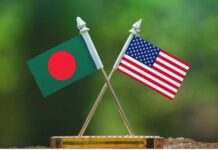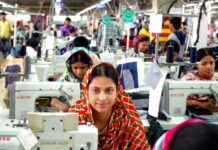
US refuses to re-admit country to the GSP, citing concerns over labour reforms
Bangladesh has again been denied re-admittance to the US trading privilege known as the Generalised System of Preferences (GSP), with Washington citing ongoing concerns over the pace of labour market reforms since the Rana Plaza tragedy.
Even though the two countries renewed their economic ties during the fourth meeting of the Trade and Investment Cooperation Forum Agreement (TICFA) in Washington, DC, on Thursday, there was no obvious change in the US stance on Bangladesh and the GSP.
The US trade program is designed to promote economic growth in the developing world by providing preferential duty-free entry for up to 4,800 products from 129 designated beneficiary countries and territories.
Bangladesh was suspended from the GSP in 2013 as a result of concerns over workers’ rights and safety shortly after the Rana Plaza building collapse that killed over 1,100 people, most of them garment workers.
Even though garment exports are not eligible for duty cuts under the program, the US continues to be Bangladesh’s single largest export destination, with two-way trade hitting $7.2 billion in 2017.
“The United States particularly noted its concerns on overall labour reforms and expressed its hope for ongoing collaboration with the private sector on worker safety,” according to a statement issued by the United States Trade Representative.
In the meeting, Bangladesh sought US cooperation to implement the Trade Facilitation Agreement (TFA).
Signed by Bangladesh and the US in November 2013, the agreement provides a mechanism for both governments to discuss trade and investment issues and areas of cooperation.
The US representatives discussed the expansion of US exports to Bangladesh, particularly cotton and medicine, and also focused on enabling a digital economy, protection of intellectual property and transparency in government procurement.
According to a statement issued by Bangladeshi embassy spokesperson Shamim Ahmad, Bangladesh highlighted the various steps taken in the country towards creating a favourable investment climate and sought more US investment in Bangladesh.
The delegation also requested the US to facilitate access of Bangladeshi nurses and midwives and easy access to other service sectors.
Thursday’s meeting was co-chaired by Mark Linscott, Assistant US Trade Representative for South and Central Asian Affairs; and Shubhashish Bose, Bangladesh’s Secretary of Commerce.
The 12-member Bangladeshi delegation also included Secretary to Ministry of Labour & Employment Ms. Afroza Khan; Executive Chairman of BEPZA Maj Gen Mohammad Habibur Rahman Khan; Bangladesh Investment Development Secretary Moinul Islam; Director General, WTO Cell Md Munir Chowdhury; Member of National Board of Revenue Prakash Dewan; and senior officials of the Commerce and the Foreign Affairs Ministries.
Source: Dhaka Tribune.









